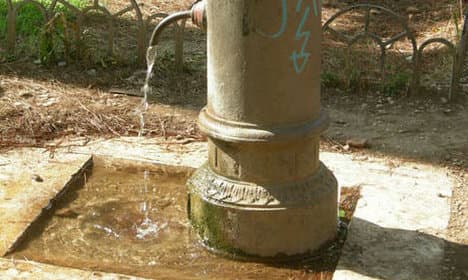Are Italy's drinking fountains safe?

A study published by Italian consumers Altroconsumo this week would suggest not.
The study analyzed the drinking water from public fountains across 35 cities in Italy and found that in two cities the water was contaminated.
The study checked samples of drinking water by measuring for things like hardness, calcium, sulphur, fluoride, heavy metals and traces of pollutants.
The study found that samples from two of Italy's largest cities, Genoa and Florence contained dangerous levels of lead. The samples were taken from fountains in Piazza Colombo in Genoa and Piazza della Signora in Florence.
Current laws limit safe levels of lead in drinking water at 10 micrograms per litre, however the samples taken from Genoa were three almost times over the limit (24,8 μg/l ). Alarmingly, samples taken from Florence were more than five times over the set threshold (56,6 μg/l).
Altroconsumo expressed their concern about the potentially dangerous water that is available in what are heavily trafficked areas of two of Italy's biggest cities.
In a letter sent to the local health authority of Florence, the consumer group stated: “the contaminated water is available to thousands of tourists who pass through Piazza della Signora each day,” Il Fatto Alimentare reported.
Actute lead poisoning occurs when blood contains a level of lead higher than (10 μg/l) micrograms per litre for an adult and (5 μg/l) for children. Symptoms vary depending on the individual and level of exposure but include muscle weakness, abdominal pain, constipation and nausea.
High levels of lead in the blood over an extended period can cause chronic lead poisoning which can cause seizures, coma and even death.
Comments
See Also
The study analyzed the drinking water from public fountains across 35 cities in Italy and found that in two cities the water was contaminated.
The study checked samples of drinking water by measuring for things like hardness, calcium, sulphur, fluoride, heavy metals and traces of pollutants.
The study found that samples from two of Italy's largest cities, Genoa and Florence contained dangerous levels of lead. The samples were taken from fountains in Piazza Colombo in Genoa and Piazza della Signora in Florence.
Current laws limit safe levels of lead in drinking water at 10 micrograms per litre, however the samples taken from Genoa were three almost times over the limit (24,8 μg/l ). Alarmingly, samples taken from Florence were more than five times over the set threshold (56,6 μg/l).
Altroconsumo expressed their concern about the potentially dangerous water that is available in what are heavily trafficked areas of two of Italy's biggest cities.
In a letter sent to the local health authority of Florence, the consumer group stated: “the contaminated water is available to thousands of tourists who pass through Piazza della Signora each day,” Il Fatto Alimentare reported.
Actute lead poisoning occurs when blood contains a level of lead higher than (10 μg/l) micrograms per litre for an adult and (5 μg/l) for children. Symptoms vary depending on the individual and level of exposure but include muscle weakness, abdominal pain, constipation and nausea.
High levels of lead in the blood over an extended period can cause chronic lead poisoning which can cause seizures, coma and even death.
Join the conversation in our comments section below. Share your own views and experience and if you have a question or suggestion for our journalists then email us at [email protected].
Please keep comments civil, constructive and on topic – and make sure to read our terms of use before getting involved.
Please log in here to leave a comment.